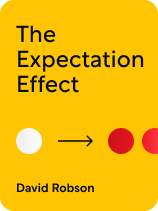

This article is an excerpt from the Shortform book guide to "The Expectation Effect" by David Robson. Shortform has the world's best summaries and analyses of books you should be reading.
Like this article? Sign up for a free trial here.
What is the placebo effect in psychology? How can you make the placebo effect work for you, rather than against you?
Perhaps the most well-known expectation effect is the placebo effect. While some people are against the placebo effect, David Robson’s book The Expectation Effect asserts that it can actually be used to improve your health and life.
Check out how the placebo effect can create a positive impact on you.
Placebo Effect
What is the placebo effect in psychology? A placebo is a treatment that doesn’t exert a direct chemical effect on the body but can have an indirect effect because of our expectations. Robson explains that when we think a placebo treatment will work, these expectations can create the same biological effects we’d experience with the actual treatment. This works even when we know that we’re taking a placebo because our subconscious expectations still tell the brain that it should start the biological processes that promote healing.
(Shortform note: The placebo effect is widely studied and documented, and experts explain it in a number of ways. In Predictably Irrational, Dan Ariely writes that the effect operates via two mechanisms: faith and conditioning. If you have faith in the placebo, it’s likely to make you feel better. And if your body is conditioned to release pain-alleviating chemicals when you anticipate treatment, then even a placebo can produce that conditioned response.)
To make the placebo effect work for you, Robson recommends a few strategies:
Give the Placebo a Chance
First, Robson recommends that if you learn that a treatment your healthcare provider suggests might work via the placebo effect, give it a try and focus on the results. Remember that a placebo works because it produces some of the same effects as an active treatment: If you experience relief from a placebo, that reduction in symptoms or pain is real.
(Shortform note: It’s the effect of the treatment that matters, even when that treatment is a placebo. In Lost Connections, Johann Hari writes that when your belief in the power of a treatment makes it work, that doesn’t mean that the improvements are all in your head: Placebos create measurable changes in the body, and it’s that effect that matters.)
See a Healthcare Provider You Trust
Next, when you can choose which doctor to see, select someone you trust. If you feel reassured after seeing your doctor, that sense of care might act as a placebo and speed up your recovery.
(Shortform note: Experts agree that having a doctor you trust has benefits for your health. A recent review of almost 1,000 studies found a strong correlation between physician empathy and patient satisfaction. The researchers also noted that empathy on the part of healthcare providers seems to lower patients’ levels of anxiety and lead to better outcomes.)
Try an Open-Label Placebo
Finally, Robson advises considering a sugar pill: A placebo can work even if you know it’s a placebo, as researchers find in tests of “open-label placebos,” pills that patients know won’t directly affect their symptoms. An open-label placebo could supplement your active treatment.
(Shortform note: You can buy open-label placebo pills on Amazon, and while not everyone agrees that they work, some experts argue that it makes sense to give it a try. Still, some people have a strong response to an open-label placebo and some have none at all. Critics say that the recent enthusiasm for the use of placebos should be tempered by caution: Reviews find that placebos typically have modest effects, and the best results are found for self-reported subjective symptoms such as pain and nausea. They say that the science on open-label placebos, in particular, is shaky and constitutes a weak evidence base for clinical practice.)

———End of Preview———
Like what you just read? Read the rest of the world's best book summary and analysis of David Robson's "The Expectation Effect" at Shortform.
Here's what you'll find in our full The Expectation Effect summary:
- Why you should rely on your body, not the universe, to make you happier
- How your brain can control your health, longevity, and quality of life
- Why you should focus on the benefits of getting older, rather than fearing it






